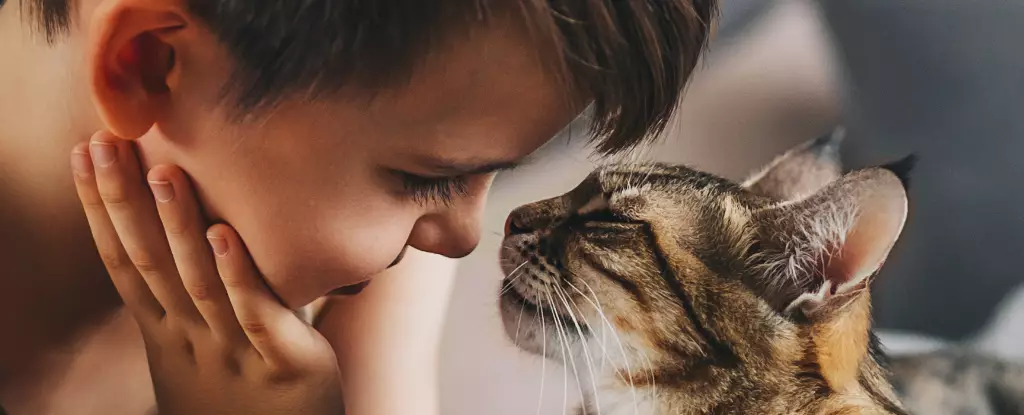Cats have coexisted with humans for millennia, serving as both companions and companions. Their quirky behavior and soothing purring have made them beloved members of many households. Yet, as we delve into the relationship between cats and their human counterparts, we begin to realize that this bond comes with its own set of complexities, impacting our physical and mental well-being in ways that often go unnoticed.
The deep connection between humans and cats can be both fulfilling and multifaceted. Unlike dogs, which often demonstrate overt loyalty, cats appear to be more independent and discerning. However, studies indicate that many cat owners feel a profound sense of attachment to their feline friends, often equating them with family members. Research conducted among Dutch cat owners found that about half consider their cats as part of the family, while a significant portion perceives them as akin to children or best friends. On a psychological level, this relationship is nuanced; the emotional support provided by cats can influence owners’ self-worth and sense of purpose.
Moreover, cats exhibit remarkable social intelligence. They can recognize when humans speak directly to them and often respond with specific behaviors that demonstrate their affection. For instance, the unique way they use meows is thought to be a form of communication that appeals to human nurturing instincts, showcasing an adaptive aspect of their behavior that has evolved alongside human interaction.
While the companionship of cats is often associated with positive health outcomes—such as reduced stress and lower risks of cardiovascular diseases—these benefits are not universally experienced. Numerous studies have illustrated that cat owners generally report lower levels of social isolation and psychological distress. However, these findings must be interpreted with caution. Many of these studies highlight correlation rather than causation; thus, while cat owners may exhibit lower risks for heart-related issues, it cannot be definitively concluded that cats are the sole reason for these health benefits.
Additionally, the nuances of individual relationships with pets play a significant role. For example, people who view their pets as companions—those who see them as co-dependent relationships—report a greater emotional bond and higher levels of psychological well-being. On the flip side, those relationships could occasionally create undue emotional burdens, particularly in instances where a pet is ill. Some pet owners have reported experiencing caregiver stress, especially in cases of chronic ailments, indicating a relationship that can be both rewarding and challenging.
Interestingly, studies focusing on veterans and their pets provided insight into this dichotomy of benefit and risk. Many veterans cited their cats as crucial to their daily functioning, offering an emotional anchor amid struggles like anxiety and depression. While these affirmations highlight the importance of feline companionship, it raises questions about the underlying reasons for such dependence. Are cats a source of healing, or do they serve primarily as emotional crutches for those dealing with more severe mental health issues?
The complex interplay between pet ownership and mental health calls for more nuanced and qualitative research. While quantitative studies identify statistical trends, they often fail to capture the rich, personal narratives that illuminate the emotional landscape of pet ownership.
As rewarding as cat ownership can be, it is important to acknowledge the potential risks involved as well. Cats are known carriers of zoonotic diseases, such as toxoplasmosis, which can pose particular risks to pregnant women and individuals with weakened immune systems. This parasite, primarily transmitted through cat feces, can result in severe complications if proper hygiene practices are not followed.
In addition, cat allergens pose another concern for many households. Cat saliva and dander can provoke allergic reactions in susceptible individuals, highlighting the necessity for appropriate home management strategies to minimize exposure. Interestingly, some studies suggest that early exposure to pets, including cats, might actually reduce the risk of developing allergies later in life, indicating that the relationship between humans and cats is not strictly detrimental.
The relationship between humans and cats is rich with emotional benefits and physical health implications, reflecting both the joys and the challenges of pet ownership. While these furry companions can enhance our lives through emotional support and companionship, it is crucial to approach this relationship with awareness of its potential drawbacks. Acknowledging both sides of the equation allows for a deeper understanding of what it truly means to share your life with a cat. Cats may inspire laughter and provide comfort, but they also require careful attention to health and emotional well-being, making the journey of cat ownership a uniquely rewarding, though occasionally complicated, experience.


Leave a Reply